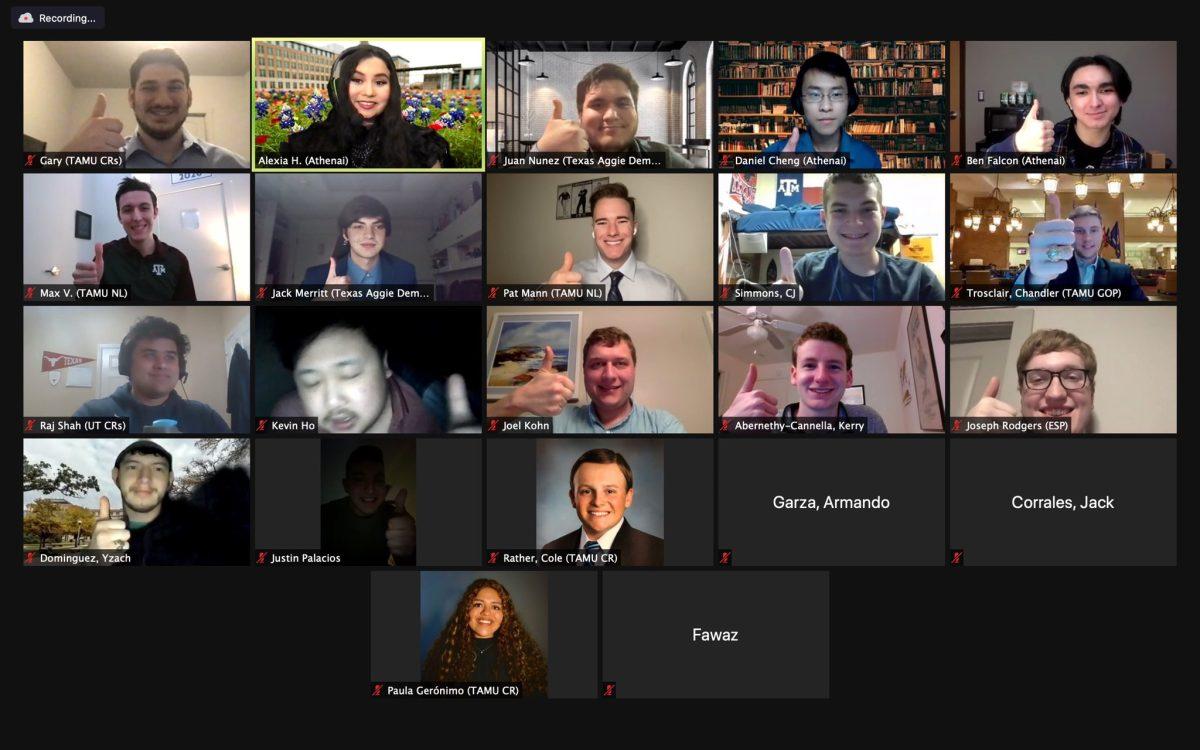In a move that set aside ideological differences, four Texas A&M organizations met Saturday to discuss human rights violations, diplomacy and more.
On the evening of March 6 the Athenai Institute’s Texas chapter, Texas A&M New Liberals, Texas A&M College Republicans and Aggie Democrats, virtually gathered to discuss ways to combat authoritarianism within the Chinese Communist Party’s, or CCP.
Daniel Cheng, the president of the Athenai Institute’s Texas chapter, started the first of the four presentations by saying that China has violated human rights in their mass incarceration of Uyghurs.
“Inside those camps, we see systemic abuse such as beatings, rape [and] forced conversion,” Cheng said. “The Uyghurs are mostly Muslims, [and] a lot of them are being force fed pork and alcohol, and Uyghur women are forcefully sterilized.”
However, the CCP’s influence reaches the shores of the United States as well. Chinese language and culture centers like Confucius Institutes which teach Beijing-approved Chinese history are established in the U.S. through partnerships among universities as well as Hanban, an organization within China’s Ministry of Education, Alexia Hernandez with the Athenai Institute said.
However, they do not acknowledge human rights concerns and are considered a threat to national security by the United States government, Hernandez said.
“As of September 2020, the U.S. had 67 Confucius Institutes, with two being in Texas,” Hernandez said. “Texas A&M actually had a Confucius Institute until 2018.”
In the second presentation, lead organizer of the New Liberals Pat Mann addressed the CCP’s actions interfering with trade relating to developing countries, causing issues with debt trap diplomacy and necessitating an economic solution.
“One of the best ways [to go] about it is to strengthen the countries that surround China, and you can do that through Vietnam, the Philippines, South Korea and Taiwan,” Mann said.
However, reform is necessary within United States’ institutions to have a stronger position to combat the lack of inclusivity within the CCP, Max Valadez with the New Liberals said.
“Wrapping back to something that New Liberals strongly believe in is inclusive institutions,” Valadez said. “We have to promote inclusive civic and social values, strengthening voting rights, strengthening things of what it means to be a true democracy.”
Chandler Trosclair, with Texas A&M College Republicans, followed the New Liberals’s presentation and said China has taken actions toward reinforcing its military and commercial naval presence.
“China is making a substantial effort to not only destabilize the region but simultaneously exert authority through actors that can create ambiguity on the battlefield,” Trosclair said.
The islands in the South China Sea are also significant, as China has transformed them by constructing landing strips, among other strategic additions, Trosclair said.
“These islands could have the potential to serve to move and [mobilize] airspace and command and control over specific regions [by] placing these islands in a specific manner, … [which] could lead to a takeover of the region,” Trosclair said.
Neocolonialism is also a specific concern within the region, as it’s a destructive yet subtle method of control, said Gary Frankel, the chairman of Texas A&M College Republicans.
“The modern version of neocolonialism prefers to use economics and geopolitics as methods of control, rather than the direct occupation of a territory, because … it is a lot dicier to seize territory from a political perspective nowadays,” Frankel said.
Juan Nunez, the vice president of Aggie Democrats, said in his presentation that China has a long history of suppressing the internet in what he calls the “Great Firewall of China.”
“The Great Firewall has diminished every aspect of the internet. It’s the biggest digital boundary in the whole world,” Nunez said.
On a similar note, the Hong Kong National Security Law has severe implications for the separate nature of the Chinese and Hong Kong governments, the President of Aggie Democrats Jack Merrit said.
“Hong Kong, previously semi-independent from China under the One Country, Two Systems doctrine … was brought more in line with the oppression of the republic,” Merrit said. “It essentially destroyed any sense of a separate legal system [or] any sense of sovereignty for Hong Kong.”
The Hong Kong National Security Law allows for the expansion of Chinese propaganda networks, Merrit said.
“With the quashing of American and European business, telecom businesses [or] social media, that means the only thing that can fill in the place is social media and certain businesses that are operated by the grasp of Beijing,” Merrit said.
However, all of the organizations ultimately agree on one major point concerning the CCP, Valadez said.
“We agree across the board with everyone here tonight … that the CCP is absolutely committing human rights atrocities, and it’s unacceptable and it’s something that we can all unite against,” Valadez said.
Aggies discuss Chinese Communist Party’s authoritarianism at bipartisan event
March 7, 2021
Photo by Via @Athenai_TX on Twitter
Aggies met virtually on March 6 for a discussion over foreign policy, the political spectrum and the Chinese Communist Party.
0
Donate to The Battalion
$2065
$5000
Contributed
Our Goal
Your donation will support the student journalists of Texas A&M University - College Station. Your contribution will allow us to purchase equipment and cover our annual website hosting costs, in addition to paying freelance staffers for their work, travel costs for coverage and more!
More to Discover










